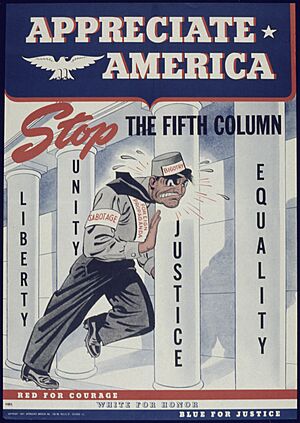Fifth column facts for kids
A fifth column is a group of people who secretly work against their own country or a larger group. They usually help an enemy from the inside. Think of them as secret agents or helpers for an opposing side. Their actions can be open or hidden. They might cause trouble, spread false information, spy, or even commit acts of terrorism. All these actions happen from within the country's borders.
Contents
Where Did the Term "Fifth Column" Come From?
The phrase "fifth column" (originally quinta columna in Spanish) first appeared during the Spanish Civil War. This war happened in Spain in the late 1930s. The term became popular in October 1936. It quickly spread to other countries.
Many people believe General Emilio Mola coined the term. He was a leader of the Nationalist forces attacking Madrid. The story goes that Mola said his forces had four columns of soldiers marching on Madrid. He also claimed there was a "fifth column" of supporters already inside the city. These secret supporters were waiting to help from within.
Historians have not found the exact statement where Mola said this. However, the idea of a secret group helping an enemy from the inside stuck. The term became widely used to describe such hidden threats.
The Fifth Column During World War II
Fears in the United States and Britain
By the late 1930s, people in the United States worried about getting involved in World War II. The term "fifth column" was often used to warn about possible spies or disloyal people. These people might be working against the U.S. from within.
The quick fall of France to Germany in 1940 made these fears worse. Some believed France fell because of secret pro-German groups inside the country. These groups were seen as a "fifth column."
In June 1940, British Prime Minister Winston Churchill spoke about these worries. He told Parliament that they had powers to stop "Fifth Column activities." Around the same time, Life magazine showed photos warning about "signs of Nazi Fifth Column Everywhere."
Traitors and Collaborators
During the Nazi invasion of Norway, a Norwegian politician named Vidkun Quisling helped the invaders. He quickly set up a new government with himself as Prime Minister. Because of his actions, the word "quisling" became a new term. It meant a "collaborator" or "traitor" who helps an enemy.
After the Japanese attack on Pearl Harbor in 1941, fears of a fifth column grew in the U.S. Secretary of the Navy Frank Knox said that "the most effective Fifth Column work" happened in Hawaii. This led to great suspicion about Japanese Americans. Many innocent Japanese Americans were later moved to special camps. This was due to fears they might help Japan.
In the Philippines, some Japanese immigrants were accused of helping the Japanese invasion. They were seen as a "fifth column" within the country.
Later Uses of the Term
The idea of a "fifth column" has been used many times since World War II.
- Czechoslovakia (1938): German groups in Czechoslovakia were accused of being a "fifth column." They helped Nazi Germany before its invasion.
- Cold War (1940s-1980s): After World War II, the U.S. government saw communist parties in other countries as "fifth columns." They believed these groups were working for the Soviet Union.
- Japan and North Korea: Some people in Japan see Zainichi Koreans (Koreans living in Japan) as a "fifth column." This is especially true for those linked to North Korea. This fear grew after North Korea kidnapped Japanese citizens and tested missiles.
- Israel: Some Israeli Jews view Israeli Arabs as a "fifth column." This is because many Israeli Arabs support the Palestinian cause more than the State of Israel.
- Europe and Muslims: Some politicians in Europe have called Western Muslims a "fifth column." They claim these groups want to change Western countries' values. For example, after a terrorist attack in Paris in 2015, a British politician said Europe had a "fifth column living within our own countries."
- Russia (2022): In 2022, Russian President Vladimir Putin called Russians who were against the invasion of Ukraine "fifth columnists" and "national traitors."
See also
 In Spanish: Quinta columna para niños
In Spanish: Quinta columna para niños
- Alien infiltration
- Black propaganda
- Copperhead (politics)
- Demographic threat
- Entryism
- False flag
- Front organization
- Internal enemy
- Jash (term)
- Quisling
- Sleeper cell
- Stay-behind


